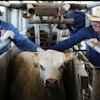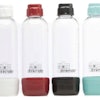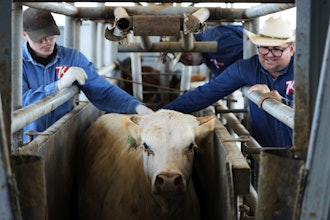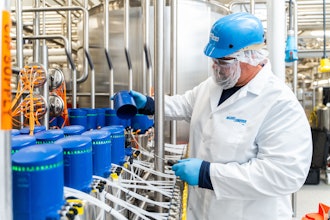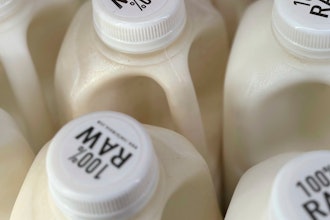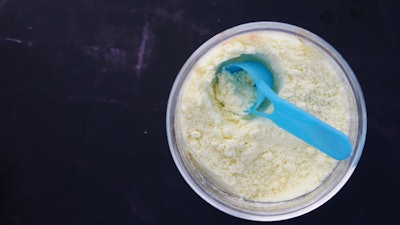
WASHINGTON — The U.S. Food and Drug Administration on Wednesday issued warning letters to three infant formula manufacturers as part of the agency’s ongoing commitment to enhance regulatory oversight to help ensure that the industry is producing infant formula under the safest conditions possible.
These warning letters for violations of the Federal Food, Drug, and Cosmetic Act (FD&C Act) and the FDA’s Infant Formula regulations were issued to ByHeart Inc., Mead Johnson Nutrition (Reckitt), and Perrigo Wisconsin, LLC. They reflect findings from FDA inspections of these facilities over the last several months. At the time of each inspection, the FDA issued inspectional observations and exercised oversight of each firm as they initiated recalls (in December 2022, February 2023 and March 2023) to remove product potentially contaminated with Cronobacter sakazakii from the marketplace.
Importantly, the FDA does not advise parents and caregivers to discard or avoid purchasing any particular infant formula at this time. The agency is not aware of any distributed product where contamination was confirmed and believes that the recalls were effective in removing the potentially contaminated batches of product from the market. Additionally, these warning letters are not associated with any current recalls and therefore the FDA does not anticipate any impact to the availability of infant formula on the market.
The FDA is issuing these letters now as part of its normal regulatory process and to reinforce to these firms the importance of instituting and maintaining appropriate corrective actions when they detect pathogens to ensure compliance with the FDA’s laws and regulations. As part of this, the firms must, among other things, thoroughly conduct root cause investigations and perform subsequent cleaning and sanitation activities. Notably, firms also need to properly evaluate their cleaning and sanitation practices, schedules, and procedures before releasing product. Each company will have 15 working days to respond to the FDA to explain what corrective actions they are taking. The FDA will assess the adequacy of the companies’ corrective actions in the agency’s review of the responses and during the FDA’s next inspection of each facility. During these inspections the agency will verify proper implementation of appropriate corrective actions taken by each company.
“Infant formula manufacturers are responsible for ensuring they make safe products, and the agency has remained in ongoing discussions with the infant formula industry to address the agency’s concerns. The FDA is committed to identifying and acting on issues early to prevent any firms from reaching the level of concern that prompted last year’s large-scale recall and contributed to the infant formula shortage,” said Donald Prater, acting director of the FDA’s Center for Food Safety and Applied Nutrition. “Over the last year the FDA has continued to increase our oversight of powdered infant formula facilities. These letters are a reflection of this enhanced oversight and are intended to help the industry continuously improve the safety of their manufacturing practices, so that parents and caregivers can be confident that the formula they feed their children is safe and nutritious.”
The actions are the latest in the FDA’s ongoing effort to strengthen the safety and resiliency of the infant formula supply in the U.S. In November 2022, the agency released an outline of a prevention strategy to prevent Cronobacter sakazakii illnesses associated with consumption of powdered infant formula. As part of that strategy, the FDA has been working with Congress to strengthen our regulatory tools and increase funding to oversee the infant formula industry and has worked closely with the U.S. Centers for Disease Control and Prevention (CDC) to support the Council of State and Territorial Epidemiologists' decision to add invasive Cronobacter infections among infants under one year of age to the Nationally Notifiable Conditions List. The agency has already started to hire staff as part of our work to establish a dedicated cadre of infant formula investigators and an Office of Critical Foods, both of which will strengthen the regulatory oversight of infant formula.
Healthy supply of infant formula available in the U.S. market
Consumers should know that the U.S. infant formula supply is healthy with in-stock rates at 85% or higher since the beginning of 2023. The current strength of this market can be largely attributed to the many actions taken by the FDA and other U.S. government partners through 2022 and 2023, which are outlined in the FDA’s National Strategy to Increase the Resiliency of the Infant Formula Market.
Ensuring the safety of powdered infant formula at home
Parents and caregivers should follow manufacturer instructions for preparing powdered infant formula. For babies less than 2 months old, born prematurely, or with weakened immune systems the CDC recommends, if possible, using ready-to-feed liquid infant formula. Liquid infant formula is made to be sterile (without germs) and is the safest option for infants not receiving breast milk. However, parents and caregivers can also take extra steps to prepare powdered formula for these infant groups by heating water to at least 158°F/70°C to help protect against Cronobacter, adding the powdered infant formula and mixing, and then cooling the formula to body temperature (98.6°F) before feeding.
However, certain metabolic and specialty products include statements on their packaging warning consumers against heating because heating that particular product above 100°F could result in a loss of vitamins and nutrients. Therefore, caregivers should be especially mindful of the manufacturer’s instructions included on the packaging for metabolic and specialty formulas.
The FDA will continue its regulatory oversight and engagement with industry to enhance infant formula safety, including continuing to conduct annual inspections of infant formula facilities, maintaining a dialogue with infant formula manufacturers on these issues, and furthering prevention-based research and activities.
In addition to around-the-clock regulatory work, the FDA remains steadfast in upholding the commitment to unify and strengthen the FDA Human Foods Program. This new vision comes as a result of the agency’s review of findings and recommendations from an external evaluation conducted by the Reagan-Udall Foundation, at the request of the FDA Commissioner, following the agency’s infant formula supply chain response.

